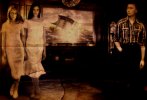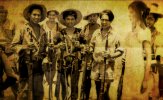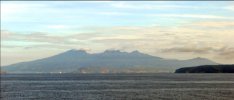13. Bataan Peninsula, somewhere west of Balanga on the slopes of Mount Mariveles, night to daybreak, April 13-14, 1942.
“Are we there yet?” asked Barb, her tone ... bordering on a whine ... signaling her growing impatience and weariness.
“No, it’s farther on yet,” was Alejandro’s curt reply.
They had been walking into the wilds for what already seemed to Barb like an eternity since leaving Alejandro’s home in Balanga shortly after nightfall. Picking their way through the back ways, with Alejandro leading, followed by Barb, Natalie, and several paces back, Alejandro’s father, they had been compelled to dodge three Japanese patrols before leaving the town behind. From there it was into the peninsula’s rugged backcountry ... sparsely populated and dominated by Mount Mariavales, a towering dormant volcano, majestically capped at its summit by a wide caldera.
At first they had passed through, under bright moonlight, a mixed landscape of open grasslands and bushy thickets, but as they began to negotiate the foothills and gullies leading to Mariavales’ lower slopes they found themselves passing in gloomy darkness through dense stands of tropical hardwoods. And the further they trudged, the narrow trail beneath their feet got rougher and more difficult to navigate. Fortunately their hosts had provided Barb and Natalie with sandals fashioned from old rubber tires which, although they fit poorly, provided them with something that offered their bare feet a modicum of relief from the rigors of the trek.
It was part way up a steep ravine where they had encountered their first partisans ... a pair of heavily-armed Filipinos, dressed in dark pajama-like clothing, who had suddenly stepped out of the foliage on either side of the trail to block any further advance. But after a brief exchange of words with Alejandro, they stepped aside, melting as swiftly and silently as they had first appeared into the surrounding gloom.
This had happened twice more before they reached a stretch of fairly level ground that had been cleared of forest cover. For the first time it was possible to see for any distance, and they found that if they turned around, the lights of Manila could be seen twinkling in the distance at the far end of Manila Bay as well as the dark mass of the island of Corrigedor silhouetted against the silvery waters that surrounded it.
“Can we please stop here and rest for a little?” begged Barb, abruptly plopping herself down atop a large trail-side boulder. “My feet are killing me. Look! This one’s actually bleeding!”
“Alright, but not for long. We’re nowhere near there yet,” responded Alejandro, his tone signaling his exasperation with any delay.
“By the way, what did you say to those partisans?” queried Barb as she ruefully inspected the blood-flecked abrasion along the side of her foot.
“Nothing important.”
“They certainly backed off quickly.”
He shrugged and turned his back.
Soon the were on their way again, climbing ... always climbing ... the trail becoming so steep in places that they had to reach for and grab at exposed roots and nearby branches to help them move forward. It was tough going and Barb and Natalie both lobbied for another rest stop, but Alejandro wouldn’t hear of it. At one point they even tried to force the issue by refusing to take another step, but Alejandro’s father came up from behind to prod them on, propelling them into motion with a threatening wave of the business end of the sturdy walking stick he carried.
But, thankfully, it wasn’t too long after that bit of unpleasantness that Alejandro informed them that they were at last nearing their destination.
Once again, their path was abruptly blocked by armed partisans ... five of them this time, rather than the usual pair. And once again a few softly-uttered words from Alejandro gained passage and they pressed on. They were indeed close, for it was only around the next bend in the trail, as it turned out, that they found themselves within the partisan camp.
The camp lay under a thick forest canopy that concealed it from aerial observation, and consisted of a sizable number of crude huts arranged rather haphazardly around a couple of fire pits, over which a morning meal was being prepared. A general buzz of activity permeated the camp, as dawn was fast approaching, and the partisans ... dozens of them so it appeared ... were up and moving about. They were all dressed in one version or another of the same dark clothing. They appeared lightly armed, although a few had bandoliers of ammunition wrapped around their torsos.
The two white women were regarded by all with curiosity.
“So, this is it?” asked Barb.
Alejandro nodded.
“And, you think we’ll be safe here?”
Alejandro nodded.
“Okay. Natalie and I want to thank you, then ... you and your father, as well as your grandfather ... for taking the risk to shelter us in your home, making contact with the partisans, and bringing us here to their camp safely. And I want to apologize for the complaining back on the trail as well. We are forever in your debt.”
Alejandro nodded.
“So, then ...” she continued, looking past him. “Any idea who might be in charge here? Natalie and I will need to properly present ourselves, and find out just what these men are prepared to do to help us. Can you make some inquiries and find out who we should be talking to, please?”
“That won’t be necessary.”
“What? ......... oh ........... you don’t mean?”
Alejandro nodded.
**************
As dawn was breaking Whitaker and his buddies were on their feet and ready to rejoin the march. The previous day they had made it as far as Orani, nearly half the distance from where the march had begun to their destination at the San Fernando railhead. That day had taken its toll on their unit. By Whitaker’s reckoning, perhaps as many as a quarter of the remaining men of the 45th Regiment had fallen out along the way from exhaustion, only to be summarily executed alongside the road by the Japanese guards.
Lieutenant Moore’s nurses had not fared well either. Of the eleven who remained after Moore’s disappearance, only seven were still alive by day’s end.
Sometime around midday, with the column held up and marking time, as it so often was, four unfortunates, who had reached their limits of endurance, balked at continuing on. And, as Whitaker and his comrades looked on helplessly, a number of Japanese soldiers had herded the recalcitrant nurses over to the verge of the road. There, they had forcibly stripped them naked, knocked them to the ground and proceeded to beat and bayonet the defenseless women to death as they lay writhing in the ditch.
Sickened by what he had witnessed, Whitaker had moved off with his men as the march resumed, but the memory of the atrocity could not be shaken off. His concern for the surviving nurses would become an obsession. Glancing back over his shoulder, as often as he dared, over the course of the day, he kept a watchful eye on the nurses trudging along behind in a tight little mutually supportive knot, the pained expressions on their faces reflecting the traumatic shock they all felt. He wondered whether Lieutenant Moore, were she still there, could have ... or would have ... done anything to prevent the unspeakable tragedy that had occurred. He imagined not.
So on this morning, in the hopes of taking some action himself to protect the surviving nurses from any further atrocities, he took the liberty of ordering them into the ranks of his own men as the column formed up to continue the march. He knew that doing so was a gamble. The protective move on his part ran the risk of provoking their Japanese escorts, as up until then the nurses had trailed behind under their own guard.
But, thankfully, no objection was made ... possibly, he thought to himself, because the hated Sergeant Kubo and two of his men had disappeared along with Lieutenant Moore, and the remaining member of Kubo’s detail, seemed a reasonably amiable sort in his superior’s absence. Indeed, he seemed to have taken a friendly interest in one of the nurses in particular.
“Nice move,” remarked Norm as they set off. “Looks like you got away with it.”
“Yeah,” said Whitaker. “At least for now.”
************
That morning found Tanaka bent over the hood of the ‘Type 95’ near the edge of Balanga, writing a dispatch to General Homma. Having spent the entire previous day touring the burnt-out center of the town to assess the extent of the disaster, he now labored to find the words to describe what he had seen and learned.
It had been a black day for the Japanese 14th Army, which had suffered nearly three hundred dead, and more than a thousand wounded, many of them suffering from severe burns that might yet take their lives. The army’s comfort station, which had been located in the destroyed town hall had ceased to exist, and there had been, as yet, untold losses of equipment and motor transport.
No one seemed to know exactly what had happened. The reports cited only a large explosion followed by an immense fireball. There was speculation that it was shelling from the big American guns on Corregidor, but Tanaka had dismissed that, knowing that the island fortress was too far away, and even if wasn’t, its guns were unlikely to cause a blast that great.
The other theory was that the calamity was the work of partisans. Tanaka had his doubts about that as well, believing that the ragtag partisan bands operating in the back-country behind Balanga lacked the kinds of explosives and skills needed to set off such a conflagration. But this had become the accepted explanation in the minds of local commanders, who had already ordered the rounding up of hundreds of the town’s residents, both men and women, for public executions to be carried out as a reprisal the very next day, and for every day thereafter until the perpetrators were exposed and captured.
With all that he had had to do and think about, Tanaka had been far too busy to give more than a passing thought to the plight of Lieutenant Moore and her army nurses. He assumed that somewhere to the north of where he stood they were setting out that morning for another day’s trek on the road to the railhead at San Fernando.
He wished them well.





 ...
...







 . But I guess I prefer the latter one.
. But I guess I prefer the latter one.

